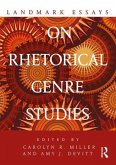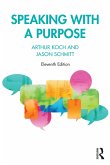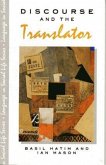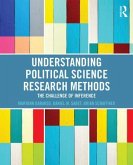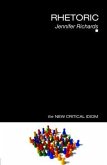Routledge Handbook of Descriptive Rhetorical Studies and World Languages
Herausgeber: Schnell, James; Wei, Weixiao
Routledge Handbook of Descriptive Rhetorical Studies and World Languages
Herausgeber: Schnell, James; Wei, Weixiao
- Gebundenes Buch
- Merkliste
- Auf die Merkliste
- Bewerten Bewerten
- Teilen
- Produkt teilen
- Produkterinnerung
- Produkterinnerung
Routledge Handbook of Descriptive Rhetorical Studies and World Languages offers a useful collection of papers that present rhetorical analysis of the discoursal practice in different cultural settings.
Andere Kunden interessierten sich auch für
![Violence, Silence, and Rhetorical Cultures of Champion-Building in Sports Violence, Silence, and Rhetorical Cultures of Champion-Building in Sports]() Kathleen Sandell Hardesty (USA Florida Polytechnic University)Violence, Silence, and Rhetorical Cultures of Champion-Building in Sports66,99 €
Kathleen Sandell Hardesty (USA Florida Polytechnic University)Violence, Silence, and Rhetorical Cultures of Champion-Building in Sports66,99 €![Landmark Essays on Rhetorical Genre Studies Landmark Essays on Rhetorical Genre Studies]() Landmark Essays on Rhetorical Genre Studies77,99 €
Landmark Essays on Rhetorical Genre Studies77,99 €![Speaking with a Purpose Speaking with a Purpose]() Arthur KochSpeaking with a Purpose85,99 €
Arthur KochSpeaking with a Purpose85,99 €![Discourse and the Translator Discourse and the Translator]() Basil HatimDiscourse and the Translator78,99 €
Basil HatimDiscourse and the Translator78,99 €![Rhetorical Public Speaking Rhetorical Public Speaking]() Nathan CrickRhetorical Public Speaking51,99 €
Nathan CrickRhetorical Public Speaking51,99 €![Understanding Political Science Research Methods Understanding Political Science Research Methods]() Maryann BaraksoUnderstanding Political Science Research Methods96,99 €
Maryann BaraksoUnderstanding Political Science Research Methods96,99 €![Rhetoric Rhetoric]() Jennifer Richards (UK University of Newcastle upon Tyne)Rhetoric33,99 €
Jennifer Richards (UK University of Newcastle upon Tyne)Rhetoric33,99 €-
-
-
Routledge Handbook of Descriptive Rhetorical Studies and World Languages offers a useful collection of papers that present rhetorical analysis of the discoursal practice in different cultural settings.
Hinweis: Dieser Artikel kann nur an eine deutsche Lieferadresse ausgeliefert werden.
Hinweis: Dieser Artikel kann nur an eine deutsche Lieferadresse ausgeliefert werden.
Produktdetails
- Produktdetails
- Verlag: Taylor & Francis Ltd
- Seitenzahl: 466
- Erscheinungstermin: 12. Mai 2023
- Englisch
- Abmessung: 180mm x 254mm x 34mm
- Gewicht: 948g
- ISBN-13: 9781032049441
- ISBN-10: 1032049448
- Artikelnr.: 67515477
- Herstellerkennzeichnung
- Libri GmbH
- Europaallee 1
- 36244 Bad Hersfeld
- gpsr@libri.de
- Verlag: Taylor & Francis Ltd
- Seitenzahl: 466
- Erscheinungstermin: 12. Mai 2023
- Englisch
- Abmessung: 180mm x 254mm x 34mm
- Gewicht: 948g
- ISBN-13: 9781032049441
- ISBN-10: 1032049448
- Artikelnr.: 67515477
- Herstellerkennzeichnung
- Libri GmbH
- Europaallee 1
- 36244 Bad Hersfeld
- gpsr@libri.de
Weixiao Wei has been working as a lecturer at the College of Foreign Languages and Literatures, Taiyuan University of Technology, China, for 12 years since she obtained her MA degree in 2010. In July 2017, she received a visiting scholarship from the China Scholarship Council (CSC) to undertake research projects at Swansea University, UK, for a year. Since then, she has published two monographs and six book chapters with Routledge. She is currently the chief editor of the Routledge Handbook of Descriptive Rhetorical Studies and is planning another handbook of language learning in a global context. She is also the editor of the Chinese language studies section in the upcoming Routledge Research Encyclopedia of Chinese Studies. In addition to preparing research papers, a monograph and an edited volume for further publication, she has been pursuing her PhD study in rhetoric and composition at University of Houston, USA. James Schnell, PhD (Ohio University), is an Assistant Professor in the Defense Critical Languages & Culture Program at the University of Montana, USA. He is a three-time Fulbright Scholar (Cambodia, Myanmar and Kosovo) and has published widely on matters having to do with cross-cultural communication, most specifically focusing on China. Schnell has taught in the USA at Cleveland State University, Ohio State University, University of Cincinnati, and Miami University and in China at Beijing Jiaotong University. He was a visiting scholar at Fudan University, China, in 2017.
Editorial Board List of Figures List of Tables List of Contributors Introduction (Weixiao Wei) I. Historical dimension of rhetorical studies 1. Mandate of Heaven at the root of Chinese political rhetoric: Origin, transformation and legacy (Weixiao Wei and Yuqian Wei) 2. Gods of the Thresholds: The liminal origns of rhetorical theory in ancient global myth (Shawn D. Ramsey) 3. Rhetoric and Silence in Corporate America: Ending the patent war between Google and Microsoft (Joshua Welsh ) 4. From the learning of classical rhetoric to the learning of communication: The evolution of rhetoric in the secondary education systems of Spain and Portugal (Gracia Terol ) 5. Evolution of Arabic rhetoric: from classical bal
gha to modern concepts of persuasion (Marcin Styszy
ski ) II. Descriptive rhetorical studies: Regional diversity 6. Rhetorical devices in Japanese: The case for onomatopoeia (Massimiliano Tomasi ) 7. Rhetoric of Russian Civilizational Identity: A Case Study of Patriarch Kirill's Discourse (Natalia Bruffaerts ) 8. Media sensationalism of the West and the rhetoric of poverty porn in India(Sony Jalarajan Raj and Adith K Suresh) 9. Rhetoric of protest, tradition and identity: Polish songs of freedom and resistance (Agnieszka Kampka ) 10. A descriptive study of Arabic rhetorics (Rabeea Al-Mubarak and Ian E.J.Hill ) III. Descriptive studies of political rhetoric 11. The Democrat's Linguistic Stance towards Migration in Electoral Campaigns: Ethos, Logos, and Pathos in Barack Obama and Joe Biden's Discourses (Teresa Fernández-Ulloa and María del Carmen López-Ruiz) 12. Political rhetoric in Jonathan Swift
s Conduct of the Allies. Boosting and hedging as persuasive devices (Rosa María López-Campillo) 13. The rhetoric of the immigration discourse of far-right parties in Spain and France (Isabel Negro ) 14. Rhetoric of Polish political discourse on family ( Ewa Bogdanowska-Jakubowska & Nika Bogdanowska) 15. Multimodal nationalist rhetoric in Finland: From Banal to Extreme Political Persuasion (Eemeli Hakoköngäs and Inari Sakki ) 16. Between adversariness and compromise: a rhetorical analysis of Greek political discourse in times of crisis (Assimakis Tseronis and Dimitris Serafis ) IV. Rhetorical analysis of academic and professional texts 17. The Failing Essay: Broadening the "Composition" of Critical Pedagogy in the Age of Digital Literacy (Bradley A. Hammer ) 18. Diverse Voices?: A Rhetorical Analysis of First-Year Composition Textbooks and Open Education Resources (Mary F. McGinnis ) 19. Demonstrating and debating climate change: the function of rhetoric from science to the public (Ferenc Jankó and Priszcilla Hafenscher ) 20. A Descriptive Study of Rhetoric in South Korean Business Texts: CEOs' Quality Management Rhetoric and Audience Responses (Mansup Heo ) 21. Discursive Strategies of Persuasion in the Film Review Genre: the Case of the Reviewer's Ethos (Dominika Topa-Bryniarska ) V. The visual and affective domains of descriptive rhetorical analysis 22. Visual rhetoric of Otherness in newspaper photographs of the European refugee crisis (Jari Martikainen ) 23. Visual representation of food in Italian cinemäVisual representation of food in Italian cinema(Fatma Nazl
Köksal & Ümit
natç
) 24. The Ethos- Pathos continuum in the Portuguese "Obrigado" Advertising Campaign (Samuel Mateus ) 25. Emotional rationality as an indicator of rhetoric discourse in Polish agricultural texts (Maria Joanna Gondek and Pawe
Nowak ) 26. Rhetoric in Travel Writing: A Tool to Enhance Verisimilitude and Persuade Readers (David Taranco) 27. Ethos, Pathos, and Logos in Culture: An Analysis and Visualization of the Rhetorical Structure of Narrative in Japanese (Tetsuta Komatsubara) Index
gha to modern concepts of persuasion (Marcin Styszy
ski ) II. Descriptive rhetorical studies: Regional diversity 6. Rhetorical devices in Japanese: The case for onomatopoeia (Massimiliano Tomasi ) 7. Rhetoric of Russian Civilizational Identity: A Case Study of Patriarch Kirill's Discourse (Natalia Bruffaerts ) 8. Media sensationalism of the West and the rhetoric of poverty porn in India(Sony Jalarajan Raj and Adith K Suresh) 9. Rhetoric of protest, tradition and identity: Polish songs of freedom and resistance (Agnieszka Kampka ) 10. A descriptive study of Arabic rhetorics (Rabeea Al-Mubarak and Ian E.J.Hill ) III. Descriptive studies of political rhetoric 11. The Democrat's Linguistic Stance towards Migration in Electoral Campaigns: Ethos, Logos, and Pathos in Barack Obama and Joe Biden's Discourses (Teresa Fernández-Ulloa and María del Carmen López-Ruiz) 12. Political rhetoric in Jonathan Swift
s Conduct of the Allies. Boosting and hedging as persuasive devices (Rosa María López-Campillo) 13. The rhetoric of the immigration discourse of far-right parties in Spain and France (Isabel Negro ) 14. Rhetoric of Polish political discourse on family ( Ewa Bogdanowska-Jakubowska & Nika Bogdanowska) 15. Multimodal nationalist rhetoric in Finland: From Banal to Extreme Political Persuasion (Eemeli Hakoköngäs and Inari Sakki ) 16. Between adversariness and compromise: a rhetorical analysis of Greek political discourse in times of crisis (Assimakis Tseronis and Dimitris Serafis ) IV. Rhetorical analysis of academic and professional texts 17. The Failing Essay: Broadening the "Composition" of Critical Pedagogy in the Age of Digital Literacy (Bradley A. Hammer ) 18. Diverse Voices?: A Rhetorical Analysis of First-Year Composition Textbooks and Open Education Resources (Mary F. McGinnis ) 19. Demonstrating and debating climate change: the function of rhetoric from science to the public (Ferenc Jankó and Priszcilla Hafenscher ) 20. A Descriptive Study of Rhetoric in South Korean Business Texts: CEOs' Quality Management Rhetoric and Audience Responses (Mansup Heo ) 21. Discursive Strategies of Persuasion in the Film Review Genre: the Case of the Reviewer's Ethos (Dominika Topa-Bryniarska ) V. The visual and affective domains of descriptive rhetorical analysis 22. Visual rhetoric of Otherness in newspaper photographs of the European refugee crisis (Jari Martikainen ) 23. Visual representation of food in Italian cinemäVisual representation of food in Italian cinema(Fatma Nazl
Köksal & Ümit
natç
) 24. The Ethos- Pathos continuum in the Portuguese "Obrigado" Advertising Campaign (Samuel Mateus ) 25. Emotional rationality as an indicator of rhetoric discourse in Polish agricultural texts (Maria Joanna Gondek and Pawe
Nowak ) 26. Rhetoric in Travel Writing: A Tool to Enhance Verisimilitude and Persuade Readers (David Taranco) 27. Ethos, Pathos, and Logos in Culture: An Analysis and Visualization of the Rhetorical Structure of Narrative in Japanese (Tetsuta Komatsubara) Index
Editorial Board List of Figures List of Tables List of Contributors Introduction (Weixiao Wei) I. Historical dimension of rhetorical studies 1. Mandate of Heaven at the root of Chinese political rhetoric: Origin, transformation and legacy (Weixiao Wei and Yuqian Wei) 2. Gods of the Thresholds: The liminal origns of rhetorical theory in ancient global myth (Shawn D. Ramsey) 3. Rhetoric and Silence in Corporate America: Ending the patent war between Google and Microsoft (Joshua Welsh ) 4. From the learning of classical rhetoric to the learning of communication: The evolution of rhetoric in the secondary education systems of Spain and Portugal (Gracia Terol ) 5. Evolution of Arabic rhetoric: from classical bal
gha to modern concepts of persuasion (Marcin Styszy
ski ) II. Descriptive rhetorical studies: Regional diversity 6. Rhetorical devices in Japanese: The case for onomatopoeia (Massimiliano Tomasi ) 7. Rhetoric of Russian Civilizational Identity: A Case Study of Patriarch Kirill's Discourse (Natalia Bruffaerts ) 8. Media sensationalism of the West and the rhetoric of poverty porn in India(Sony Jalarajan Raj and Adith K Suresh) 9. Rhetoric of protest, tradition and identity: Polish songs of freedom and resistance (Agnieszka Kampka ) 10. A descriptive study of Arabic rhetorics (Rabeea Al-Mubarak and Ian E.J.Hill ) III. Descriptive studies of political rhetoric 11. The Democrat's Linguistic Stance towards Migration in Electoral Campaigns: Ethos, Logos, and Pathos in Barack Obama and Joe Biden's Discourses (Teresa Fernández-Ulloa and María del Carmen López-Ruiz) 12. Political rhetoric in Jonathan Swift
s Conduct of the Allies. Boosting and hedging as persuasive devices (Rosa María López-Campillo) 13. The rhetoric of the immigration discourse of far-right parties in Spain and France (Isabel Negro ) 14. Rhetoric of Polish political discourse on family ( Ewa Bogdanowska-Jakubowska & Nika Bogdanowska) 15. Multimodal nationalist rhetoric in Finland: From Banal to Extreme Political Persuasion (Eemeli Hakoköngäs and Inari Sakki ) 16. Between adversariness and compromise: a rhetorical analysis of Greek political discourse in times of crisis (Assimakis Tseronis and Dimitris Serafis ) IV. Rhetorical analysis of academic and professional texts 17. The Failing Essay: Broadening the "Composition" of Critical Pedagogy in the Age of Digital Literacy (Bradley A. Hammer ) 18. Diverse Voices?: A Rhetorical Analysis of First-Year Composition Textbooks and Open Education Resources (Mary F. McGinnis ) 19. Demonstrating and debating climate change: the function of rhetoric from science to the public (Ferenc Jankó and Priszcilla Hafenscher ) 20. A Descriptive Study of Rhetoric in South Korean Business Texts: CEOs' Quality Management Rhetoric and Audience Responses (Mansup Heo ) 21. Discursive Strategies of Persuasion in the Film Review Genre: the Case of the Reviewer's Ethos (Dominika Topa-Bryniarska ) V. The visual and affective domains of descriptive rhetorical analysis 22. Visual rhetoric of Otherness in newspaper photographs of the European refugee crisis (Jari Martikainen ) 23. Visual representation of food in Italian cinemäVisual representation of food in Italian cinema(Fatma Nazl
Köksal & Ümit
natç
) 24. The Ethos- Pathos continuum in the Portuguese "Obrigado" Advertising Campaign (Samuel Mateus ) 25. Emotional rationality as an indicator of rhetoric discourse in Polish agricultural texts (Maria Joanna Gondek and Pawe
Nowak ) 26. Rhetoric in Travel Writing: A Tool to Enhance Verisimilitude and Persuade Readers (David Taranco) 27. Ethos, Pathos, and Logos in Culture: An Analysis and Visualization of the Rhetorical Structure of Narrative in Japanese (Tetsuta Komatsubara) Index
gha to modern concepts of persuasion (Marcin Styszy
ski ) II. Descriptive rhetorical studies: Regional diversity 6. Rhetorical devices in Japanese: The case for onomatopoeia (Massimiliano Tomasi ) 7. Rhetoric of Russian Civilizational Identity: A Case Study of Patriarch Kirill's Discourse (Natalia Bruffaerts ) 8. Media sensationalism of the West and the rhetoric of poverty porn in India(Sony Jalarajan Raj and Adith K Suresh) 9. Rhetoric of protest, tradition and identity: Polish songs of freedom and resistance (Agnieszka Kampka ) 10. A descriptive study of Arabic rhetorics (Rabeea Al-Mubarak and Ian E.J.Hill ) III. Descriptive studies of political rhetoric 11. The Democrat's Linguistic Stance towards Migration in Electoral Campaigns: Ethos, Logos, and Pathos in Barack Obama and Joe Biden's Discourses (Teresa Fernández-Ulloa and María del Carmen López-Ruiz) 12. Political rhetoric in Jonathan Swift
s Conduct of the Allies. Boosting and hedging as persuasive devices (Rosa María López-Campillo) 13. The rhetoric of the immigration discourse of far-right parties in Spain and France (Isabel Negro ) 14. Rhetoric of Polish political discourse on family ( Ewa Bogdanowska-Jakubowska & Nika Bogdanowska) 15. Multimodal nationalist rhetoric in Finland: From Banal to Extreme Political Persuasion (Eemeli Hakoköngäs and Inari Sakki ) 16. Between adversariness and compromise: a rhetorical analysis of Greek political discourse in times of crisis (Assimakis Tseronis and Dimitris Serafis ) IV. Rhetorical analysis of academic and professional texts 17. The Failing Essay: Broadening the "Composition" of Critical Pedagogy in the Age of Digital Literacy (Bradley A. Hammer ) 18. Diverse Voices?: A Rhetorical Analysis of First-Year Composition Textbooks and Open Education Resources (Mary F. McGinnis ) 19. Demonstrating and debating climate change: the function of rhetoric from science to the public (Ferenc Jankó and Priszcilla Hafenscher ) 20. A Descriptive Study of Rhetoric in South Korean Business Texts: CEOs' Quality Management Rhetoric and Audience Responses (Mansup Heo ) 21. Discursive Strategies of Persuasion in the Film Review Genre: the Case of the Reviewer's Ethos (Dominika Topa-Bryniarska ) V. The visual and affective domains of descriptive rhetorical analysis 22. Visual rhetoric of Otherness in newspaper photographs of the European refugee crisis (Jari Martikainen ) 23. Visual representation of food in Italian cinemäVisual representation of food in Italian cinema(Fatma Nazl
Köksal & Ümit
natç
) 24. The Ethos- Pathos continuum in the Portuguese "Obrigado" Advertising Campaign (Samuel Mateus ) 25. Emotional rationality as an indicator of rhetoric discourse in Polish agricultural texts (Maria Joanna Gondek and Pawe
Nowak ) 26. Rhetoric in Travel Writing: A Tool to Enhance Verisimilitude and Persuade Readers (David Taranco) 27. Ethos, Pathos, and Logos in Culture: An Analysis and Visualization of the Rhetorical Structure of Narrative in Japanese (Tetsuta Komatsubara) Index



